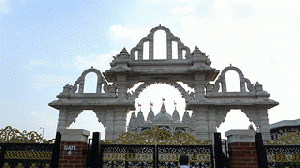This might be a remarkably brief synopsis of the incident: however, the fact remains that the Ambedkar-Periyar Study Circle (APSC), a student association, was derecognized by the prestigious Indian Institute of Technology, Madras through a mail dated May 22, 2015, for allegedly creating "hatred" of the Prime Minister Narendra Modi and the "Hindus."
The party in power in India is dangerously centered around its leader, Narendra Modi, a prototypical politician who has a larger than life image of himself, an image that he is narcissistically obsessed with and continues to promote, for lack of a real agenda of social and political development. An image perpetuated by the corporations whose interests Modi faithfully espouses, and interestingly, an image that seems to overwhelm every other member of the party, or the party itself to which he belongs.
Though in principle I think that the APSC has every right to be critical of whoever it likes and to speak against religion and religious bodies, since that's what free speech is all about, I also think that their agenda is simplistic and narrow-minded, not to mention spiteful and rabid. The APSC makes a virtue out of hate-mongering and aggressive behavior. They are people with a small-town "reporter's" frame of mind, without any serious reading or research to their credit. Their tactics are generally speaking mobbish, and they use the internet and social media like nobody's business to cast aspersions on those who disagree with them.
I find their understanding of Hindus or Hinduism, or individual believers of religion, shallow and pointlessly irreverent to say the least. I also don't think they are doing a good job of defending the cause of downtrodden communities. The regional fanaticism combined with anti-Hinduism makes me think that this is how an intellectual version of ISIS or the Taliban would look.
There are things I agree with Ambedkar and Periyar about, and there are things I obviously disagree with them. But to turn individuals into cult objects without having a critical perspective is the first step towards fanaticism. Having widely read socialists and communists I find nothing in these student groups that would form a coherent, theoretical statement on social liberation, apart from cliches that everyone is more or less familiar with. I squarely blame them for destroying the possibility of a serious, thoughtful intellectual left, the way it happened in 19th century Russia, even if that is too much to ask for in a criminally corrupt and unjust country like India, filled with opportunists of every hue, while the poor and deprived are bereft of spokespersons to articulate their concerns.
What does it mean to attack a religion such as Hinduism, if you can call it a religion instead of a culture or a civilizing force! Seen as a world-view and a set of institutions, Hinduism in South Asia has successfully withstood the ravages of historical time. My point is that you can be critical of a believer in a religion. You cannot be critical of the religion itself. Any religion is ultimately a matter of interpretation open to scholarly debate. The same religion that produced Saint Francis also produced Torquemada, who played a devious role in the Spanish Inquisition.
Hinduism is a religion, and like all religions it has positive and negative things about it. Gandhi thought Hinduism good for India and Indians, and Ambedkar felt that the liberation of the Dalit from caste system is possible with Hinduism coming to an end. Yet, I am sure both would agree that the problem is with the way the believer looks at religion and applies it in day-to- day life rather than religion as an abstract set of notions. That's the problem I have with the dehumanization of Islam in the West since the time of the Crusades. Whether Christ is a greater being than the Prophet Mohammed is not the real issue. The real issue is the extent to which Christians or Muslims are willing to include others within the discourse of the human. Between Saladin and Richard the Lionheart, I would think the former a greater human being than the latter.
Jonathan Phillips in The Crusades, 1095--1197 notes that Saladin, remembered for his extraordinary generosity and as a medieval equivalent of Ho Chi Minh, "undoubtedly impressed the westerners with his chivalric behaviour and determination, and contemporary accounts of the crusade spoke very highly of him. Such was Saladin's reputation that he became a central figure in thirteenth-century chivalric works -- a real irony: Christian knighthood using one of Islam's finest warriors as an exemplar of chivalric behaviour." That's what inclusiveness is all about: and Saladin could demonstrate such inclusiveness through "chivalric behavior" in the midst of a brutal war.
With their foolish ranting against the Prime Minister or Hindus and Hinduism the Ambedkar-Periyar Study Circle (APSC) is not something that needs to be taken seriously. With the Ministry of Human Resources Development prompting the "derecognition" of the group, the paranoid Narendra Modi government might actually be giving the APSC an importance they do not deserve.
In the end I have a poor opinion about a government that thrives on the image of one person -- Narendra Modi in this case - just as I have a poor opinion of the APSC members who should learn to be respectful of individuals and institutions. You can make a rational point without being irrationally caught up in virulent rhetoric. With nothing but blind contempt towards others, the APSC is not in any way contributing to the liberation of this country. The anti-Brahmin politics of Tamil Nadu has lethally poisoned the South Indian landscape while making the person-on-the-street as casteist as ever. We are talking about two different extremes, though it happens that one of them is in power. As far as I can see, the government and the APSC are speaking in exactly the same language: one in which there is no space for dialogue or difference.





